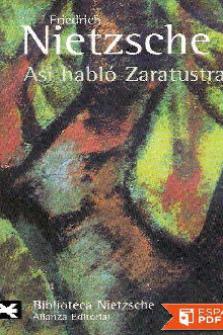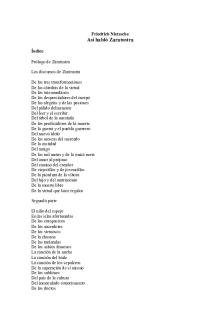Important quotes explained - The Birth of Tragedy - Friedrich Nietzsche PDF

| Title | Important quotes explained - The Birth of Tragedy - Friedrich Nietzsche |
|---|---|
| Course | StuDocu Summary Library EN |
| Institution | StuDocu University |
| Pages | 3 |
| File Size | 67.4 KB |
| File Type | |
| Total Downloads | 19 |
| Total Views | 155 |
Summary
Summary...
Description
Important Quotes But, at this juncture, when the will is most imperiled, artapproaches, as a redeeming and healing enchantress; she alone may transform these horrible reflections on the terror and absurdity of existence into representations with which man may live. These are the representation of the sublime as the artistic conquest of the awful, and of the comic as the artistic release from the nausea of the absurd. The satyric chorus of the dithyramb is the saving device of Greek art." This quote from Chapter Seven demonstrates Nietzsche's conviction that art can redeem and heal the observer. In the context of the passage, "art" stands for "Apollonian art," rather than for tragedy as a whole. Neitzsche has just discussed how the ecstasy of the Dionysian state exposes man to "the terror and absurdity of existence." But, he shall not despair, as the Apollonian image has the power to transform this shapeless terror into tangible forms that bring man joy and release. The satyric chorus saves Greek art from the horrors of its own revelations. Throughout his essay, Nietzsche constantly creates problems for Greek culture and art that he then solves with either the Apollonian or Dionysian element, depending on the context. In this quote, he shows how the Dionysian revelation cannot stand alone, for its truth is too much for man to bear. Thus the Apollonian element becomes a necessity. In other sections, the reverse is true, where the Dionysian element must come to the salvation of the Apollonian. There is a constant push and pull that exists between the Apollonian and Dionysian art forms. This dynamic relationship is the soul of tragedy. To separate this primitive and all-powerful Dionysian element from tragedy, and to construct a new and purified form on the basis of an un-Dionysian art, morality, and conception of the world—this is the tendency of Euripides as it is now clearly revealed to us. In this quote from Chapter Twelve, Nietzsche clearly elucidates the artistic goals of Euripides as he sees them, so that he may better attack them later. The crucial element of the Euripidean attack on tragedy is its denial of the Dionysian. Euripides strives to wrench art away from Dionysus's subversive grasp, so that he may purify art and align it with Socratic ethics. Euripides's conception of the world is a scientific one, and so allows no room for the mystical unity of Dionysus. By attacking the Dionysian—which Nietzsche fervently believes to be the soul of tragedy—Euripides proves that he is the enemy of art. This argument is the subject of several chapters in the essay. However, while Nietzsche focuses great attention on Euripides's animosity towards Dionysus, he never provides concrete proof that such an animosity actually existed. We see here a clear example of Nietzsche's tendency to characterize his enemies as extreme, so that he can more easily uncover the absurdities inherent in such a position. As we have learned that Dionysus is the soul of art, anyone who is against Dionysus must also be against art. With this simple proof at hand, Nietzsche never needs to delve into a serious textual analysis that might put his argument at risk. For example, he fails to show conclusively how Euripides and Sophocles are radically more different from one another than Sophocles and Aeschylus, whom he groups in the same category of pre-Socratic tragedy. The intimation is that the poet is incapable of composing until he has become unconscious and bereft of reason. While it is leveled as a criticism against Aeschylus by both Plato and Euripides, this charge of unconscious composition amounts to high praise for the Dionysian artist. For, it is only through an unconscious connection to the Primal Unity that an artist is able to create real art. His intuition, not
his reason, is his guide. The true tragic artist knows that to create consciously, while under the influence of logic, is to doom oneself to the world of phenomena and illusion. Real truth can only be accessed by an act of faith (although Nietzsche does not put it in these terms): we must abandon ourselves to the infinite abyss of the Primal Unity, trusting that Apollo will save us before we fall to our destruction. The entire beauty of this complex relationship between the artist, his art, Apollo and Dionysus is lost on the Socratic thinkers. Where we find redemption, they see only chaos and confusion. The Socratic insistence on doing all things in a premeditated, well thought out matter does not bode well for its creative potential. Nietzsche's claim that Euripides would have criticized Aeschylus for creating unconsciously is effective, as we are compelled to rise in defense of the great master of tragedy. We might be tempted to suspect this comment as yet another unsubstantiated supposition on Nietzsche's part. He does not make any effort to show us the Greek passages to support this claim. However, those who have read both Aeschylus and Euripides can attest that, while Aeschylus's writing pulls us down into the dark undercurrents of myth, Euripides's style is far more straightforward and clear and his Greek is certainly far more comprehensible to the modern student of classics. However, Euripides is unable to affect us on the same deep emotional level as Aeschylus. His rational mode of creation forces the reader to adopt a logical mindset, one that does not permit connections to the text outside of the realm of language. Optimistic dialectic drives music out of tragedy with the scourge of its syllogisms: that is, it destroys the essence of tragedy, which can be interpreted only as a manifestation and illustration of Dionysian states, as the visible symbolizing of music, as the dream-world of Dionysian ecstasy. This quote from Chapter Fourteen is an example of Nietzsche's continuous emphasis on the importance of music in tragedy. Music is the medium through which the Dionysian essence reaches the aesthetic man, who therefore becomes the "aesthetic listener." It is the only one of the arts to have direct access to the universal will, without requiring the mediation of some illusionary image. Music is the universal language, and it is through music that the universal force speaks. Music has the capacity to give birth to myth, and to give deep significance to Apollonian appearances. Nietzsche regards music with the highest reverence. No wonder, then, that Nietzsche rebels so furiously against optimistic dialectic, which seeks to drive music from the stage altogether. Nietzsche makes it clear that the theoretical man has no time for mystical unions with the Primal Unity. He is on a quest for knowledge, and anything that cannot be understood by the intellect is to be cast aside as unworthy of aesthetic attention. But, in casting music aside, Socratic culture dooms itself to a superficial quest for truth according to human conceptual frameworks. The optimistic dialectic does not possess the Dionysian power of selfrenewal, and thus it is doomed to exhaust itself. Until that day comes, however, the optimistic dialectic holds sway over culture, ensuring that Dionysian music remains in exile. Let us imagine a rising generation with this bold vision, this heroic desire for the magnificent, let us imagine the valiant step of these dragon-slayers, the proud daring with which they turn their backs on all the effeminate doctrines of optimism that they may "live resolutely," wholly, and fully: would it not be necessary for the tragic man of this culture, with his self-discipline of seriousness and terror, to desire a new art, the art of metaphysical comfort—namely, tragedy…" Nietzsche here looks to the rise of a new sort of man, who is untainted by the present cultural depravities. This man will turn his back on scientific optimism due to its obsession with knowledge and the illusions that follow. This man will strive to live his life "wholly and fully." In Nietzsche's mind, one can only live life so richly when one has rediscovered Dionysus. The Dionysian essence is the only
one that can give man any depth of experience. The tragic man of this new culture must of necessity yearn for the rebirth of tragedy. While Nietzsche relentlessly derides Socratic optimism, he is filled with an optimism of his own. He is convinced that he is witnessing his culture coming to a breaking point, and that out of the wreckage of this crumbling culture a new man with a new mission will emerge. The time is ripe for the rebirth of tragedy, cries Nietzsche, with almost religious fervor. His faith is that of a young man eager for the revolution to arrive and sweep away the rubble of his decrepit and empty culture. He has no fear in the face of the collapse of the remnants of Alexandrian culture, for the rebirth of tragedy promises new salvation and hope. Man will no longer seek comfort in empty logic, but will return to the heart of the Primal Unity to be born anew....
Similar Free PDFs

Friedrich Nietzsche
- 2 Pages

Friedrich-Nietzsche
- 12 Pages

Friedrich Nietzsche Filosofia
- 5 Pages

Mappe Friedrich Nietzsche 2
- 7 Pages

Friedrich Nietzsche - Ecce Homo
- 94 Pages

Friedrich Nietzsche (1844-1900)
- 6 Pages

Asi hablo Zaratustra - Friedrich Nietzsche
- 1,400 Pages

The Lottery of Birth
- 2 Pages

Important Quotes Bank handmaids tale
- 20 Pages
Popular Institutions
- Tinajero National High School - Annex
- Politeknik Caltex Riau
- Yokohama City University
- SGT University
- University of Al-Qadisiyah
- Divine Word College of Vigan
- Techniek College Rotterdam
- Universidade de Santiago
- Universiti Teknologi MARA Cawangan Johor Kampus Pasir Gudang
- Poltekkes Kemenkes Yogyakarta
- Baguio City National High School
- Colegio san marcos
- preparatoria uno
- Centro de Bachillerato Tecnológico Industrial y de Servicios No. 107
- Dalian Maritime University
- Quang Trung Secondary School
- Colegio Tecnológico en Informática
- Corporación Regional de Educación Superior
- Grupo CEDVA
- Dar Al Uloom University
- Centro de Estudios Preuniversitarios de la Universidad Nacional de Ingeniería
- 上智大学
- Aakash International School, Nuna Majara
- San Felipe Neri Catholic School
- Kang Chiao International School - New Taipei City
- Misamis Occidental National High School
- Institución Educativa Escuela Normal Juan Ladrilleros
- Kolehiyo ng Pantukan
- Batanes State College
- Instituto Continental
- Sekolah Menengah Kejuruan Kesehatan Kaltara (Tarakan)
- Colegio de La Inmaculada Concepcion - Cebu






